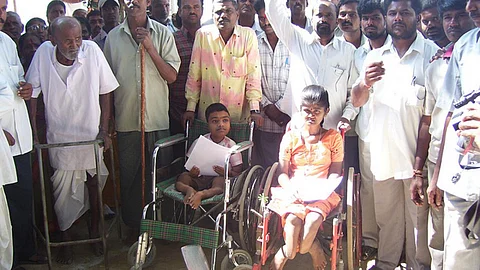
- Topics
- Feature
- Opportunities & Events
- Data
- Hindi Portal
- Topics
- Feature
- Opportunities & Events
- Data
- Hindi Portal

The Ministry of Drinking Water and Sanitation has informed the Rajya Sabha that drinking water in 66,663 habitations across the country is affected by arsenic and fluoride contamination. However, the government is working to provide safe, clean drinking water by supplying piped water to 80 percent households by 2020. Along with this, the central government is working on several new schemes and also providing both technical and financial assistance to the state governments through centrally-sponsored programmes for clean drinking water.
The Tamil Nadu government has opposed the draft National Water Framework Bill (NWFL) 2016 in order to defend its riparian rights over water. Even Punjab has shown its resentment towards the Bill while Rajasthan and Madhya Pradesh have agreed with certain amendments to the Bill. However, in view of the Cauvery water dispute between the Karnataka and the Tamil Nadu governments, the TERI Bangalore Sustainable Development Group has urged the stakeholders to reach a consensus on the provisions of the Bill proposed by the Centre.
Activists and members of River March, a citizens' group working on the rejuvenation of four Mumbai rivers, have decided to go on a Jal Satyagraha in Poisar river to protest against the concretisation work being carried out by the Brihanmumbai Municipal Corporation (BMC) on the riverbed. River March members have already written to municipal commissioner Ajoy Mehta and chief minister Devendra Fadnavis about their stand against the setting up of the retaining wall and the bed of concrete on the river. The BMC officials, however, say that the retaining walls of the nallah across the city are being concretised to support the walls so that they do not fall during rains.
Before approving funds for the Kol dam lift drinking water project, the World Bank has decided to carry out an evaluation study for the project's viability. The 1000-crore dam project aims to supply an additional 60 MLD water to ensure round-the-clock water supply in Shimla and its adjoining areas. Currently, the town gets 42-45 MLD of daily water supply from Giri, Guma, Churat, Been-Koti Bharandi and other sources.
The agriculture department in Mysuru district is encouraging farmers to construct farm ponds in order to recharge groundwater and make provision for water for domestic animals during summer months. The complete unit cost of farm ponds will be provided to farmers who have obtained job cards under the Mahatma Gandhi National Rural Employment Guarantee Act (MGNREGA). Along with this, the government has set aside an amount of Rs 87,000 for each pond. The farmers are also advised to build vermicompost pits to generate organic manure and reduce the use of chemical fertilisers.
This is a roundup of important news from February 6 - 13, 2017. Also, read the policy matters this week.